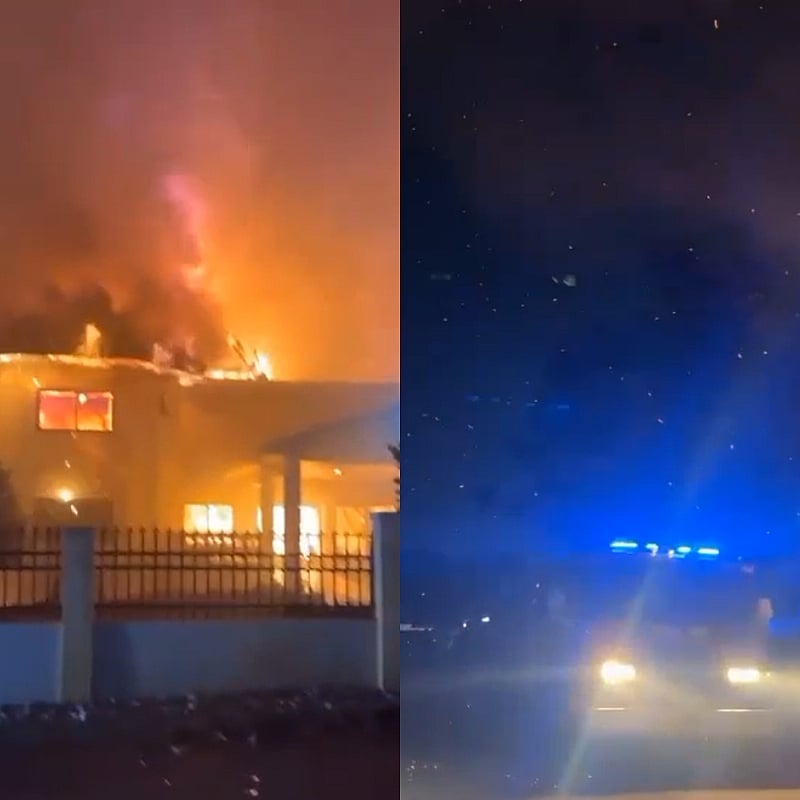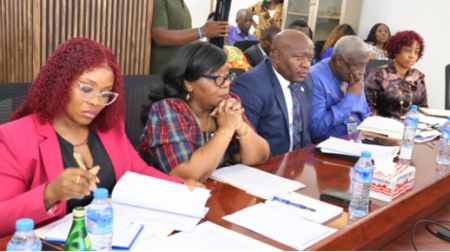The Accra Tourist Information Centre, a prominent landmark in Ghana’s capital city, became engulfed in flames on Tuesday, prompting a swift response from the Ghana National Fire Service (GNFS). The incident, the precise timing of which remains unconfirmed, unfolded dramatically, with thick plumes of smoke billowing into the sky, creating a scene of chaos and panic among visitors and staff in the surrounding area. A video capturing the early moments of the fire, posted on social media by a prominent figure, vividly depicted the intensity of the blaze and the atmosphere of alarm that it generated. Emergency responders raced to the scene and immediately engaged in efforts to contain the fire, battling against the flames and working to prevent further spread of the blaze.
The fire at the Accra Tourist Information Centre raises significant concerns about the safety and preservation of cultural and historical landmarks. Tourist information centers often serve as vital hubs for visitors, providing essential information, resources, and guidance. They often house valuable historical artifacts, documents, and displays that showcase the rich heritage and cultural identity of a region. The potential loss or damage to such resources represents a significant blow to the tourism industry and the preservation of cultural heritage. The incident underscores the need for robust fire safety measures and preventative protocols in such facilities to safeguard against potential disasters and ensure the protection of valuable assets.
While the full extent of the damage remains to be officially assessed, preliminary observations suggest that substantial portions of the facility may have sustained significant structural and property damage. The potential loss of archival materials, historical artifacts, and essential operational equipment raises concerns about the long-term impact on the center’s ability to function effectively. The incident highlights the importance of comprehensive disaster preparedness plans and the need for robust backup systems to ensure the continuity of operations in the event of unforeseen emergencies.
The rapid response of the GNFS played a critical role in containing the fire and mitigating the potential for further damage or loss of life. The prompt arrival and coordinated actions of firefighters demonstrated the importance of effective emergency response systems and the dedication of first responders in protecting lives and property. The incident underscores the need for ongoing training, equipment upgrades, and resource allocation to ensure the effectiveness and preparedness of emergency services in responding to such critical situations.
The authorities have assured the public that a thorough investigation will be conducted to determine the cause of the fire and assess its overall impact. Identifying the root cause of the incident is crucial for implementing preventative measures and enhancing fire safety protocols to prevent similar incidents in the future. The investigation will likely involve a detailed examination of the building’s electrical systems, fire safety equipment, and adherence to safety regulations. The findings of the investigation will be instrumental in informing future strategies for fire prevention and emergency preparedness in similar facilities.
The fire at the Accra Tourist Information Centre serves as a stark reminder of the importance of fire safety awareness and preparedness. Regular inspections, adherence to fire safety codes, and the implementation of comprehensive emergency plans are crucial for mitigating the risks and ensuring the safety of occupants and the protection of valuable assets. Public awareness campaigns can play a vital role in educating individuals and communities about fire safety measures and promoting responsible behavior to prevent fire-related incidents. The incident underscores the need for continuous vigilance and proactive measures to safeguard against potential fire hazards and ensure the safety and well-being of the community.














